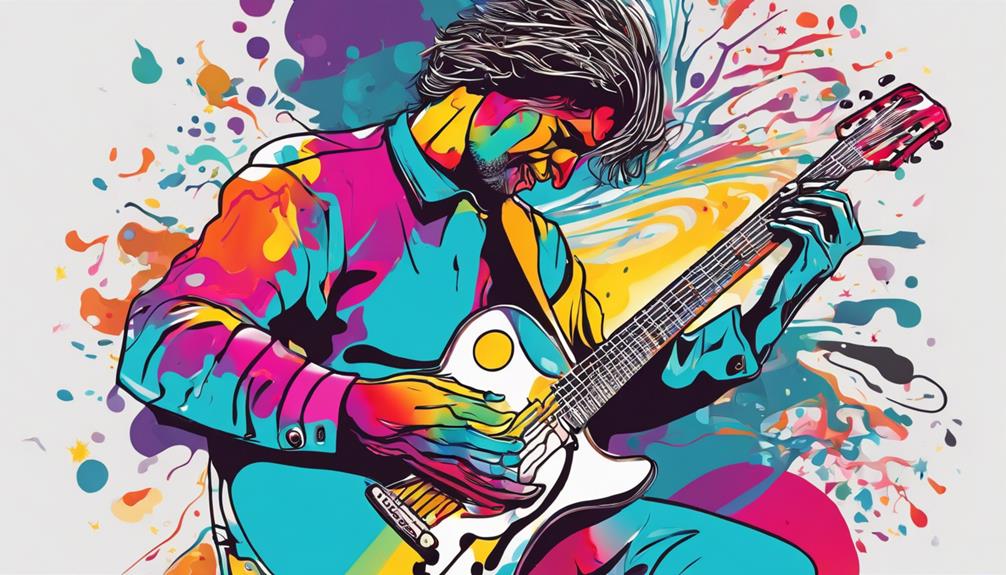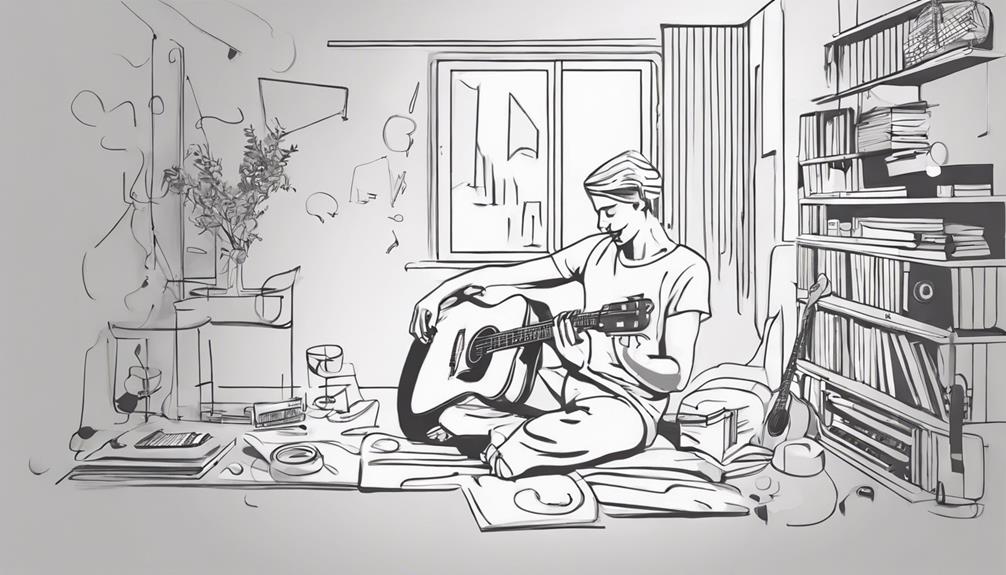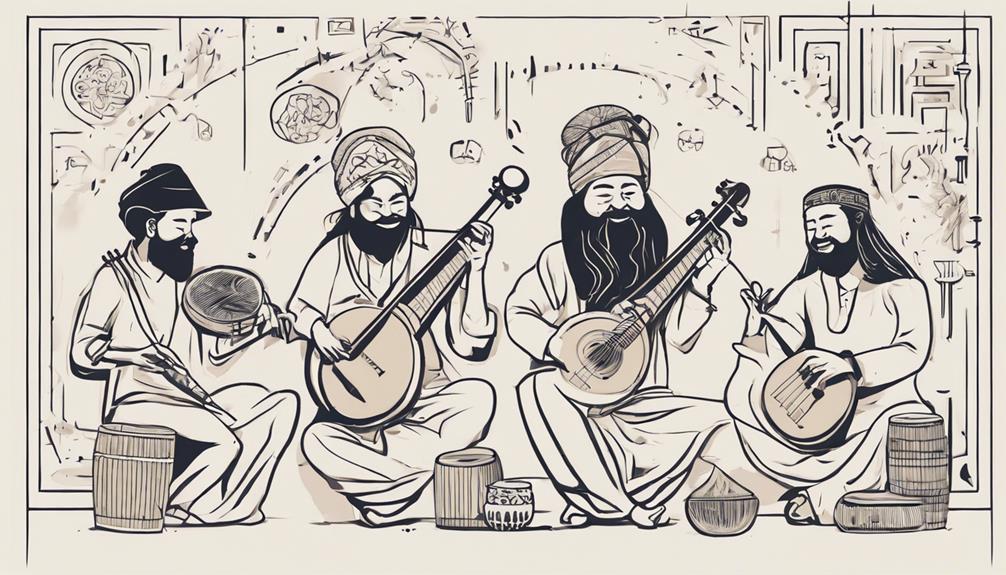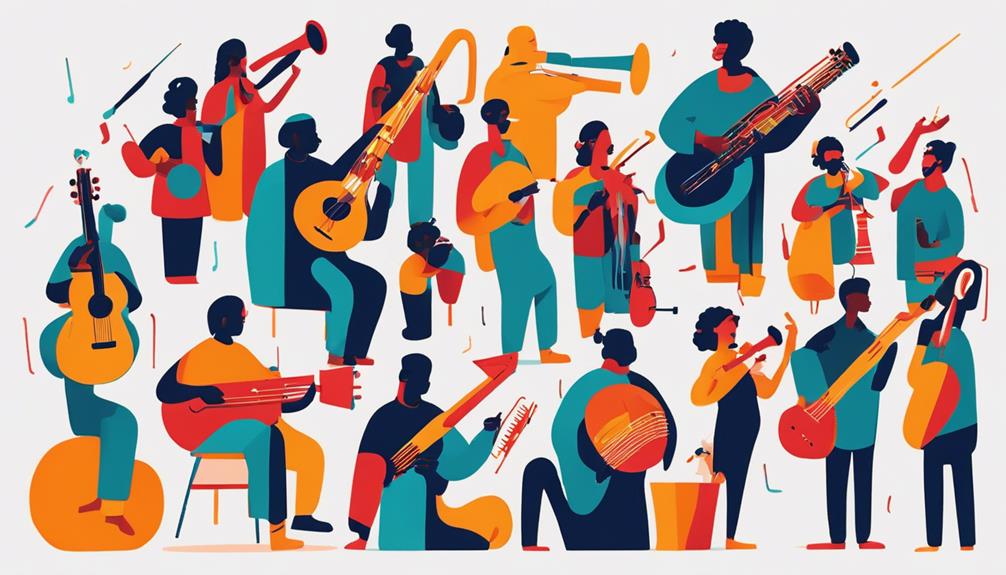The act of creating music is a complex phenomenon that intertwines with human cognition, emotions, and social dynamics. Understanding the underlying motivations behind why individuals engage in musical creation unveils a fascinating realm that delves into the core of human nature. From the intricacies of self-expression to the communal aspects of music-making, exploring the multifaceted reasons behind this universal human endeavor can provide profound insights into the essence of creativity and the human experience.
Key Takeaways
- Music creation articulates complex emotions effectively.
- Crafting melodies inspires happiness and creativity.
- Musical expression fosters joy, fulfillment, and self-expression.
- Music creation serves as a therapeutic outlet for emotional healing and stress relief.
Expressing Emotions Through Musical Creation

In the realm of artistic expression, the creation of music serves as a profound means for individuals to articulate and convey a diverse spectrum of emotions. Music offers a unique platform for expressing emotions that may be challenging to communicate through conventional language. Through the process of creating music, composers and performers can delve into the depths of their feelings, translating complex emotions into melodies, harmonies, and rhythms. This ability to translate inner experiences into musical compositions allows for a more profound and nuanced exploration of one's emotional landscape.
Creating music provides a cathartic outlet for individuals to process and externalize their emotions, whether it be joy, sorrow, love, or longing. Different genres and styles of music offer creators a vast array of tools to evoke specific emotions in both themselves and their audiences. The act of composing and performing music not only enables individuals to express their emotions but also facilitates a deeper understanding and connection with their inner selves.
Fostering Creativity and Happiness
Creating music not only enhances creativity but also contributes significantly to one's happiness. The process of crafting melodies and expressing oneself through music can bring about a sense of joy and satisfaction. By delving into musical creation, individuals can tap into their inner creativity and experience a profound sense of fulfillment.
Inspiration Through Melodies
Exploring melodies through music creation nurtures both creativity and happiness among individuals, fostering a profound sense of artistic fulfillment.
- Music creation inspires creativity by providing a platform for expressing emotions and ideas through melodies.
- Engaging in music creation can lead to increased happiness and a sense of accomplishment.
- Creating music allows individuals to explore their inner thoughts and feelings in a unique and artistic way.
Through the process of making music, individuals can delve into their emotions, thoughts, and experiences, translating them into intricate melodies that not only express their inner world but also bring joy and fulfillment. This engagement with music not only enhances personal creativity but also contributes to overall happiness and well-being.
Joy in Musical Expression
Engagement in musical expression not only serves as a creative outlet but also acts as a catalyst for fostering happiness and a sense of fulfillment in individuals. Creating music allows for the expression of emotions and creativity, leading to a feel-good experience for both the creators and listeners. This joy derived from musical expression contributes to overall well-being by boosting self-esteem and confidence. Additionally, music can serve as a powerful tool for communication, facilitating social cohesion and shared experiences among individuals. The ability to communicate through music enhances connections with others, fostering a sense of community and understanding. The process of making music not only brings personal satisfaction but also promotes happiness and a sense of belonging through the shared enjoyment of musical creations.
| Benefits of Musical Expression | ||
|---|---|---|
| Fosters creativity and joy | Enhances well-being | Boosts self-esteem |
| Acts as a form of emotional release | Facilitates social cohesion | Strengthens communication skills |
Music as a Therapeutic Outlet

Music serves as a powerful therapeutic outlet, offering emotional healing and stress relief to individuals. Through the use of music therapy, individuals can experience improved mood and cognitive abilities, leading to enhanced well-being. The field of neurological music therapy continues to explore the benefits of music in enhancing cognitive and motor functions, highlighting the significant impact of music on mental and physical health.
Emotional Healing Through Music
Utilizing music as a therapeutic outlet has been extensively studied and demonstrated to have notable benefits in emotional healing, particularly in the realms of stress reduction, anxiety alleviation, and mood enhancement.
Key Benefits:
- Music therapy can reduce stress, anxiety, and depression.
- Listening to music has been linked to improved mood, cognitive abilities, and overall well-being.
- Music is utilized in neurological music therapy to aid patients recovering from strokes and other neurological conditions.
Music therapy, including the specialized field of neurological music therapy, plays a crucial role in enhancing emotional well-being and cognitive function. Studies have shown that music can positively impact attention, memory, and cognitive tasks in individuals undergoing treatment.
Music for Stress Relief
The utilization of music as a therapeutic outlet for stress relief has been a longstanding practice with documented benefits across various aspects of mental health and emotional well-being. Listening to music helps us lower anxiety levels, reduce stress, and enhance our overall mood. This phenomenon can be explained through the lens of social psychology, where music serves as a tool for emotional regulation and relaxation. Different genres of music can evoke specific emotional responses, aiding individuals in managing stress effectively. Engaging with music provides a healthy coping mechanism for individuals experiencing stress, offering a form of self-expression and a means to unwind. Music therapy has shown positive effects on mental health, highlighting the significant role music plays in promoting emotional well-being.
Connecting With Others Through Music
Through its ability to evoke emotions and create shared experiences, music has proven to be a powerful tool in establishing connections among individuals. Music is not solely a form of entertainment but a social glue that binds people together through various means. Some ways in which music connects individuals include:
- Fostering Emotional Bonds: Music has the power to evoke strong emotions, allowing individuals to connect on a deeper level through shared feelings and experiences.
- Uniting Crowds: Commonly sung songs at events or gatherings can unite large groups of people, fostering a sense of community, patriotism, or solidarity.
- Enhancing Communication: Research suggests that the brain processes music similarly to spoken language, indicating that music can enhance communication skills and contribute to better social interactions.
In essence, music serves as a universal language that transcends barriers, bringing people together and enriching social connections in profound ways. Whether it is a mother singing to her child or a group of friends sharing their favorite tunes, music plays a vital role in shaping social bonds and fostering a sense of belonging.
Preserving Cultural Heritage Through Music

Music's role in preserving cultural heritage is fundamental, serving as a conduit for transmitting and safeguarding the traditions, values, and stories of diverse communities and societies. Traditional songs and musical styles act as a mirror reflecting the history, beliefs, and values of a particular community, ensuring that these aspects are not lost but rather passed down through generations. Through music, cultural practices, rituals, and narratives are transmitted, allowing for the preservation of rich cultural heritages worldwide. Folk music and indigenous musical traditions, in particular, play a crucial role in maintaining cultural identity and heritage, acting as a bridge between the past and the present. These forms of music serve as living archives, encapsulating the essence of a community's past and ensuring that its cultural legacy endures for future generations to appreciate and learn from.
| Preserve Cultural Heritage | Transmit Cultural Practices | Indigenous Musical Traditions |
|---|---|---|
| Acts as a conduit for transmitting traditions | Preserves rituals and narratives | Maintains cultural identity |
Seeking Self-Expression and Identity
Exploring the creation of music as a means for individuals to express their innermost identities and emotions is a fundamental aspect of self-exploration and personal reflection. Theorists believe that music serves as a powerful tool for individuals to delve into their inner thoughts, beliefs, and experiences. Through the development of music, people can communicate their unique identities and emotions, establishing a profound connection with their innermost feelings and values. Music creation not only allows individuals to articulate their inner selves but also helps them define their sense of self and place in the world. Some theorists suggest that the purpose of music lies in enabling individuals to express what may be difficult to convey through words or actions, leading to a deeper understanding of oneself. In essence, the act of creating music offers a pathway for individuals to explore, express, and solidify their identities and emotions.
- Music creation enables individuals to communicate their unique identities and emotions.
- Developing music serves as a form of self-exploration and personal reflection.
- The purpose of music is to help individuals establish their sense of self and place in the world.
Inspiring Change and Social Movements

The transformative impact of music on societal perceptions and movements has been evidenced throughout history, particularly in its role as a catalyst for inspiring change and fostering social activism. Scientists are exploring how music serves as a powerful tool in shaping beliefs and behaviors within communities. Research has found that children exposed to music with positive social messages tend to exhibit increased empathy and pro-social behaviors. This indicates that music can play a significant role in influencing mindset and promoting values of compassion and unity.
Historically, music has been intertwined with social movements, with songs like 'We Shall Overcome' becoming anthems for civil rights struggles, uniting individuals in their quest for equality. Artists such as Bob Dylan and Joan Baez used their music to protest against war and advocate for peace during the turbulent 1960s. Today, music continues to be a driving force in advocating for various causes, from environmental awareness to human rights. Its ability to convey powerful messages, evoke emotions, and mobilize individuals towards social justice makes music an indispensable tool in inspiring change and fostering societal progress.
Creating Lasting Memories Through Music
Indubitably, the interplay between music and memory formation unveils a profound mechanism for creating lasting impressions within the human psyche. Music played at significant life events can etch deep connections in our memory, causing such bonding that a simple tune can transport us back in time. Sound that conveys powerful emotions has a unique ability to trigger memories, with certain songs acting as potent triggers for vivid recollections. The intricate dance between music and memory is not merely coincidental; it is rooted in the brain's ability to associate auditory stimuli with emotional experiences, creating a robust memory network. These musical memories serve as a poignant reminder of moments past, encapsulating the essence of specific times and events in our lives. The next time you find yourself transported by a familiar melody, remember that it is not just music playing—it is the orchestration of memories being reawakened by the power of sound.
Frequently Asked Questions
Why Are People Making Music?
People engage in music creation for various reasons. Emotional expression through melody and lyrics allows individuals to convey feelings that words alone may not capture. Crafting music also enables the preservation and exploration of cultural identity, reflecting unique traditions and histories. Moreover, the act of making music can serve as a powerful stress relief tool, offering a therapeutic outlet for individuals to unwind and find solace in the creative process.
Why Do Humans Create Music?
Human creation of music is a complex interplay of emotional expression, cultural tradition, and therapeutic benefits. Music allows individuals to convey feelings and experiences beyond words, preserving and passing down cultural heritage. Its therapeutic effects on mental health and well-being are well-documented. These elements underscore the multifaceted nature of music creation, serving as a powerful medium for human connection and personal growth.
What Is the Point of Creating Music?
The point of creating music lies in its multifaceted nature as a medium for emotional expression, cultural tradition, and therapeutic benefits. Music serves as a powerful tool for individuals to convey and evoke emotions, preserve and transmit cultural heritage, and find solace and healing. Through these elements, music not only enriches lives but also fosters connections and understanding among individuals and communities.
What Was the Reason for Creating Music?
The creation of music throughout history has been driven by various factors. Emotional expression has been a significant reason for creating music, enabling individuals to convey and process feelings through sound. Additionally, music has served as a means to uphold cultural traditions, preserving and passing down societal values and narratives. Moreover, personal enjoyment plays a crucial role in music creation, as individuals derive pleasure and fulfillment from engaging in musical activities.
Conclusion
In conclusion, the act of creating music serves as a multifaceted tool for emotional expression, cultural preservation, social connection, and personal identity. Music has the power to transcend language barriers and evoke profound emotions in listeners. As the saying goes, "music speaks where words fail," highlighting the unique ability of music to communicate complex feelings and ideas. Its impact on human cognition, emotion, and social dynamics underscores its enduring significance in society.
